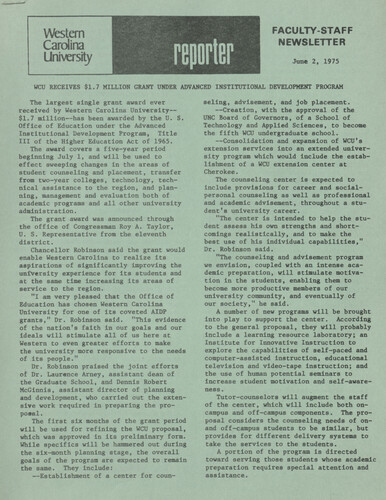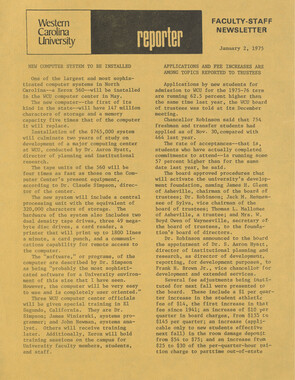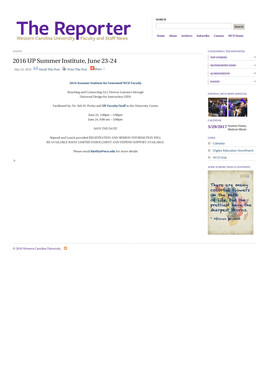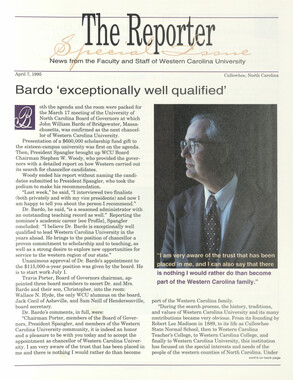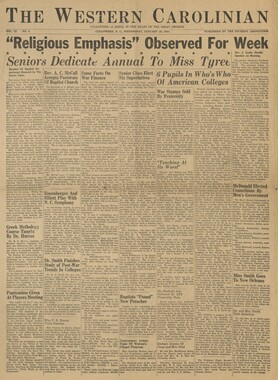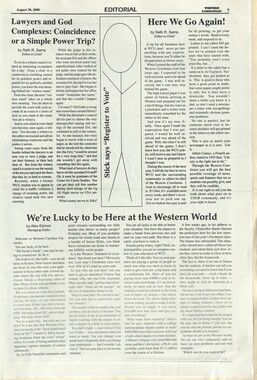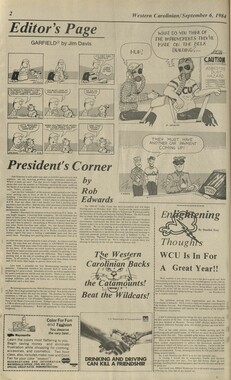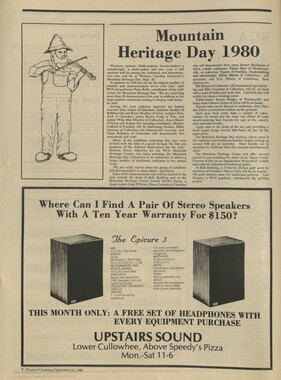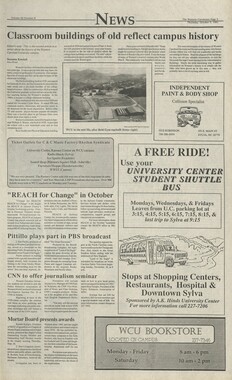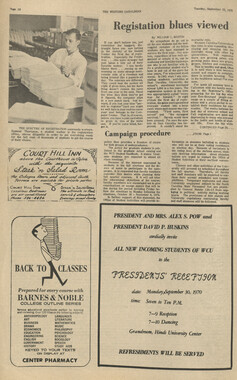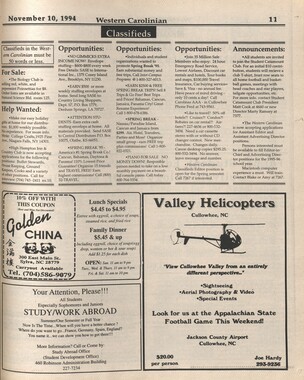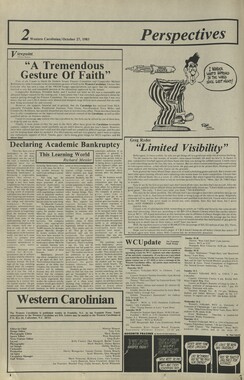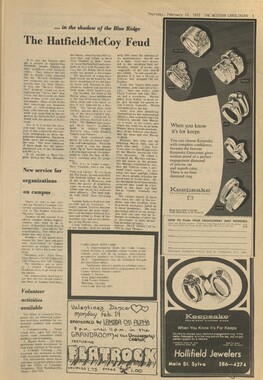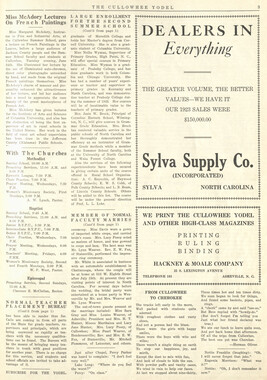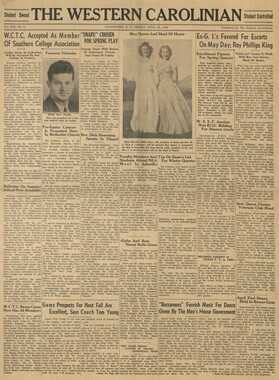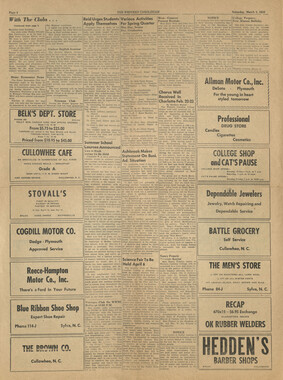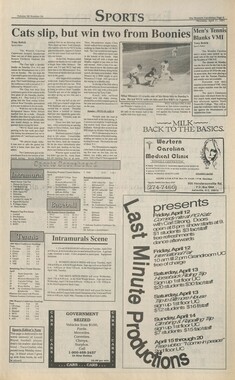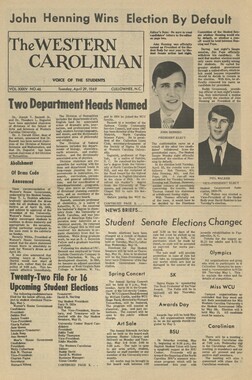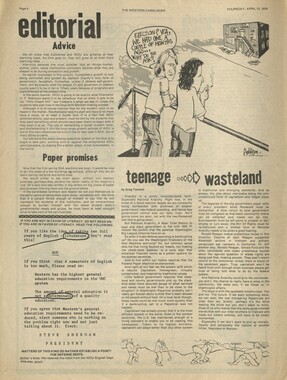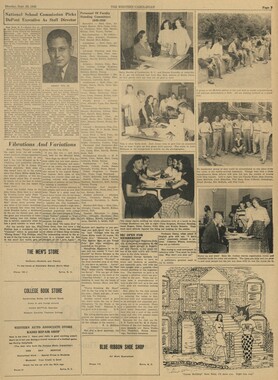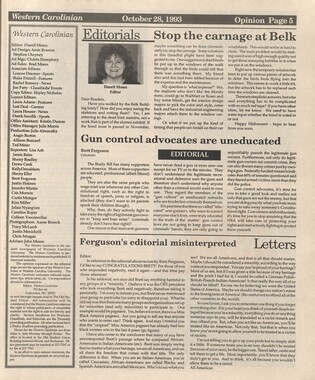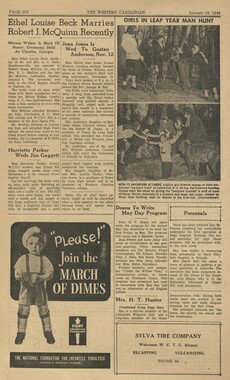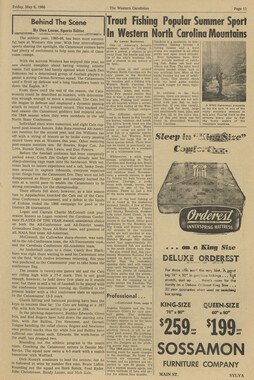Western Carolina University (20)
View all
- Canton Champion Fibre Company (2308)
- Cherokee Traditions (293)
- Civil War in Southern Appalachia (165)
- Craft Revival (1942)
- Great Smoky Mountains - A Park for America (2683)
- Highlights from Western Carolina University (430)
- Horace Kephart (941)
- Journeys Through Jackson (154)
- LGBTQIA+ Archive of Jackson County (15)
- Oral Histories of Western North Carolina (314)
- Picturing Appalachia (6679)
- Stories of Mountain Folk (413)
- Travel Western North Carolina (160)
- Western Carolina University Fine Art Museum Vitreograph Collection (129)
- Western Carolina University Herbarium (92)
- Western Carolina University: Making Memories (708)
- Western Carolina University Publications (2283)
- Western Carolina University Restricted Electronic Theses and Dissertations (146)
- Western North Carolina Regional Maps (71)
- World War II in Southern Appalachia (131)
University of North Carolina Asheville (6)
View all
- Allanstand Cottage Industries (62)
- Appalachian National Park Association (53)
- Bennett, Kelly, 1890-1974 (1295)
- Berry, Walter (76)
- Brasstown Carvers (40)
- Carver, George Washington, 1864?-1943 (26)
- Cathey, Joseph, 1803-1874 (1)
- Champion Fibre Company (233)
- Champion Paper and Fibre Company (297)
- Cherokee Indian Fair Association (16)
- Cherokee Language Program (22)
- Crowe, Amanda (40)
- Edmonston, Thomas Benton, 1842-1907 (7)
- Ensley, A. L. (Abraham Lincoln), 1865-1948 (275)
- Fromer, Irving Rhodes, 1913-1994 (70)
- George Butz (BFS 1907) (46)
- Goodrich, Frances Louisa (120)
- Grant, George Alexander, 1891-1964 (96)
- Heard, Marian Gladys (60)
- Kephart, Calvin, 1883-1969 (15)
- Kephart, Horace, 1862-1931 (313)
- Kephart, Laura, 1862-1954 (39)
- Laney, Gideon Thomas, 1889-1976 (439)
- Masa, George, 1881-1933 (61)
- McElhinney, William Julian, 1896-1953 (44)
- Niggli, Josephina, 1910-1983 (10)
- North Carolina Park Commission (105)
- Osborne, Kezia Stradley (9)
- Owens, Samuel Robert, 1918-1995 (11)
- Penland Weavers and Potters (36)
- Roberts, Vivienne (15)
- Roth, Albert, 1890-1974 (142)
- Schenck, Carl Alwin, 1868-1955 (1)
- Sherrill's Photography Studio (2565)
- Southern Highland Handicraft Guild (127)
- Southern Highlanders, Inc. (71)
- Stalcup, Jesse Bryson (46)
- Stearns, I. K. (213)
- Thompson, James Edward, 1880-1976 (226)
- United States. Indian Arts and Crafts Board (130)
- USFS (683)
- Vance, Zebulon Baird, 1830-1894 (1)
- Weaver, Zebulon, 1872-1948 (58)
- Western Carolina College (230)
- Western Carolina Teachers College (282)
- Western Carolina University (1794)
- Western Carolina University. Mountain Heritage Center (18)
- Whitman, Walt, 1819-1892 (10)
- Wilburn, Hiram Coleman, 1880-1967 (73)
- Williams, Isadora (3)
- Cain, Doreyl Ammons (0)
- Crittenden, Lorraine (0)
- Rhodes, Judy (0)
- Smith, Edward Clark (0)
- Appalachian Region, Southern (2393)
- Asheville (N.C.) (1886)
- Avery County (N.C.) (26)
- Blount County (Tenn.) (147)
- Buncombe County (N.C.) (1664)
- Cherokee County (N.C.) (283)
- Clay County (N.C.) (555)
- Graham County (N.C.) (233)
- Great Smoky Mountains National Park (N.C. and Tenn.) (478)
- Haywood County (N.C.) (3522)
- Henderson County (N.C.) (70)
- Jackson County (N.C.) (4692)
- Knox County (Tenn.) (21)
- Knoxville (Tenn.) (9)
- Lake Santeetlah (N.C.) (10)
- Macon County (N.C.) (420)
- Madison County (N.C.) (211)
- McDowell County (N.C.) (39)
- Mitchell County (N.C.) (132)
- Polk County (N.C.) (35)
- Qualla Boundary (981)
- Rutherford County (N.C.) (76)
- Swain County (N.C.) (2017)
- Transylvania County (N.C.) (247)
- Watauga County (N.C.) (12)
- Waynesville (N.C.) (68)
- Yancey County (N.C.) (72)
- Aerial Photographs (3)
- Aerial Views (60)
- Albums (books) (4)
- Articles (1)
- Artifacts (object Genre) (228)
- Biography (general Genre) (2)
- Cards (information Artifacts) (38)
- Clippings (information Artifacts) (191)
- Crafts (art Genres) (622)
- Depictions (visual Works) (21)
- Design Drawings (1)
- Drawings (visual Works) (184)
- Envelopes (73)
- Facsimiles (reproductions) (1)
- Fiction (general Genre) (4)
- Financial Records (12)
- Fliers (printed Matter) (67)
- Glass Plate Negatives (381)
- Guidebooks (2)
- Internegatives (10)
- Interviews (811)
- Land Surveys (102)
- Letters (correspondence) (1013)
- Manuscripts (documents) (619)
- Maps (documents) (159)
- Memorandums (25)
- Minutes (administrative Records) (59)
- Negatives (photographs) (5651)
- Newsletters (1285)
- Newspapers (2)
- Occupation Currency (1)
- Paintings (visual Works) (1)
- Pen And Ink Drawings (1)
- Periodicals (193)
- Personal Narratives (7)
- Photographs (12982)
- Plans (maps) (1)
- Poetry (5)
- Portraits (1655)
- Postcards (329)
- Programs (documents) (151)
- Publications (documents) (2237)
- Questionnaires (65)
- Scrapbooks (282)
- Sheet Music (1)
- Slides (photographs) (402)
- Sound Recordings (796)
- Specimens (92)
- Speeches (documents) (15)
- Tintypes (photographs) (8)
- Transcripts (322)
- Video Recordings (physical Artifacts) (23)
- Vitreographs (129)
- Text Messages (0)
- A.L. Ensley Collection (275)
- Appalachian Industrial School Records (7)
- Appalachian National Park Association Records (336)
- Axley-Meroney Collection (2)
- Bayard Wootten Photograph Collection (20)
- Bethel Rural Community Organization Collection (7)
- Blumer Collection (5)
- C.W. Slagle Collection (20)
- Canton Area Historical Museum (2110)
- Carlos C. Campbell Collection (198)
- Cataloochee History Project (65)
- Cherokee Studies Collection (4)
- Daisy Dame Photograph Album (5)
- Daniel Boone VI Collection (1)
- Doris Ulmann Photograph Collection (112)
- Elizabeth H. Lasley Collection (1)
- Elizabeth Woolworth Szold Fleharty Collection (4)
- Frank Fry Collection (95)
- George Masa Collection (173)
- Gideon Laney Collection (452)
- Hazel Scarborough Collection (2)
- Hiram C. Wilburn Papers (28)
- Historic Photographs Collection (236)
- Horace Kephart Collection (861)
- Humbard Collection (33)
- Hunter and Weaver Families Collection (1)
- I. D. Blumenthal Collection (4)
- Isadora Williams Collection (4)
- Jesse Bryson Stalcup Collection (47)
- Jim Thompson Collection (224)
- John B. Battle Collection (7)
- John C. Campbell Folk School Records (80)
- John Parris Collection (6)
- Judaculla Rock project (2)
- Kelly Bennett Collection (1314)
- Love Family Papers (11)
- Major Wiley Parris Civil War Letters (3)
- Map Collection (12)
- McFee-Misemer Civil War Letters (34)
- Mountain Heritage Center Collection (4)
- Norburn - Robertson - Thomson Families Collection (44)
- Pauline Hood Collection (7)
- Pre-Guild Collection (2)
- Qualla Arts and Crafts Mutual Collection (12)
- R.A. Romanes Collection (681)
- Rosser H. Taylor Collection (1)
- Samuel Robert Owens Collection (94)
- Sara Madison Collection (144)
- Sherrill Studio Photo Collection (2558)
- Smoky Mountains Hiking Club Collection (616)
- Stories of Mountain Folk - Radio Programs (374)
- The Reporter, Western Carolina University (510)
- Venoy and Elizabeth Reed Collection (16)
- WCU Gender and Sexuality Oral History Project (32)
- WCU Mountain Heritage Center Oral Histories (25)
- WCU Oral History Collection - Mountain People, Mountain Lives (71)
- WCU Students Newspapers Collection (1744)
- Western North Carolina Tomorrow Black Oral History Project (69)
- William Williams Stringfield Collection (2)
- Zebulon Weaver Collection (109)
- African Americans (388)
- Appalachian Trail (32)
- Artisans (521)
- Cherokee art (84)
- Cherokee artists -- North Carolina (10)
- Cherokee language (21)
- Cherokee pottery (101)
- Cherokee women (208)
- Church buildings (166)
- Civilian Conservation Corps (U.S.) (110)
- College student newspapers and periodicals (1830)
- Dams (94)
- Dance (1023)
- Education (222)
- Floods (60)
- Folk music (1015)
- Forced removal, 1813-1903 (2)
- Forest conservation (220)
- Forests and forestry (917)
- Gender nonconformity (4)
- Great Smoky Mountains National Park (N.C. and Tenn.) (154)
- Hunting (38)
- Landscape photography (10)
- Logging (103)
- Maps (84)
- Mines and mineral resources (8)
- North Carolina -- Maps (18)
- Paper industry (38)
- Postcards (255)
- Pottery (135)
- Railroad trains (69)
- Rural electrification -- North Carolina, Western (3)
- School integration -- Southern States (2)
- Segregation -- North Carolina, Western (5)
- Slavery (5)
- Sports (452)
- Storytelling (245)
- Waterfalls -- Great Smoky Mountains (N.C. and Tenn.) (66)
- Weaving -- Appalachian Region, Southern (280)
- Wood-carving -- Appalachian Region, Southern (328)
- World War, 1939-1945 (173)
The Reporter, June 1975
-
The Reporter is a publication produced by Western Carolina University featuring news, events, and campus community updates for faculty and staff. The publication began in August of 1970 and continues digitally today. Click on the link in the “Related Mate
-
-
reporter FACULTY-STAFF NEWSLETTER June 2, 1975 WCU RECEIVES $1,7 MILLION GRANT UNDER ADVANCED INSTITUTIONAL DEVELOPMENT PROGRAM The largest single grant award ever received by Western Carolina University— $1.7 million—has been awarded by the U. S. Office of Education under the Advanced Institutional Development Program, Title III of the Higher Education Act of 1965. The award covers a five-year period beginning July 1, and will be used to effect sweeping changes in the areas of student counseling and placement, transfer from two-year colleges, technology, technical assistance to the region, and planning, management and evaluation both of academic programs and all other university adminis tration. The grant award was announced through the office of Congressman Roy A. Taylor, U. S. Representative from the eleventh district. Chancellor Robinson said the grant would enable Western Carolina to realize its aspirations of significantly improving the university experience for its students and at the same time increasing its areas of service to the region. "I am very pleased that the Office of Education has chosen Western Carolina University for one of its coveted AIDP grants," Dr. Robinson said. "This evidence of the nation's faith in our goals and our ideals will stimulate all of us here at Western to even greater efforts to make the university more responsive to the needs of its people." Dr. Robinson praised the joint efforts of Dr. Laurence Arney, assistant dean of the Graduate School, and Dennis Robert McGinnis, assistant director of planning and development, who carried out the extensive work required in preparing the proposal. The first six months of the grant period will be used for refining the WCU proposal, which was approved in its preliminary form. While specifics will be hammered out during the six-month planning stage, the overall goals of the program are expected to remain the same. They include: —Establishment of a center for counseling, advisement, and job placement. —Creation, with the approval of the UNC Board of Governors, of a School of Technology and Applied Sc iences, to become the fifth WCU undergraduate school. —Consolidation and expansion of WCU's extension services into an extended university program which would include the establishment of a WCU extension center at Cherokee. The counseling center is expected to include provisions for career and social-personal counseling as well as professional and academic advisement, throughout a student's university career. "The center is intended to he lp the student assess his own strengths and shortcomings realistically, and to make the best use of his individual capabilities," Dr. Robinson said. "The counseling and advisement program we envision, coupled with an intense academic preparation, will stimulate motivation in the students, enabling them to become more productive members of our university community, and eventually of our society," he said. A number of new programs will be brought into play to support the center. According to the general proposal, they will probably include a learning resource laboratory; an Institute for Innovative Instruction to explore the capabilities of self-paced and computer-assisted instruction, educational television and video-tape instruction; and the use of human potential seminars to increase student motivation and self-aware-ness • Tutor-counselors will augment the staff of the center, which will include both on-campus and off-campus components. The proposal considers the counseling needs of on-and off-campus students to be similar, but provides for different delivery systems to take the services to the students. A portion of the program is directed toward serving those students whose academic preparation requires special attention and assistance. -2- The proposal notes that many of the projected services currently exist at WCU, but that they are fragmented and incomplete. The new center will not only provide improved coordination in these areas, but will also advise students on a continuing basis as to the prospects for employment in various fields and will help them determine their educational programs to achieve their career goals. The transfer and technology portion of the program will include the establishment of a School of Technology and Applied Sciences to prepare students for middle management and other positions in business and industry. It will combine many of WCU's present technology-related programs into one administrative structure, in an attempt to fill a gap in educational opportunity for graduates of two-year technical programs who may wish to prepare themselves for positions requiring the bachelor's degree. The program also provides for a full-time community college program coordinator to continue and expand recent WCU efforts to make it easier for community college and technical institute graduates to continue their education at Western Carolina. The technical assistance portion of the program will provide a means for communities and regional businesses and industries to communicate their needs to the university more easily so WCU can be more responsive to those needs. Under the planning, management, and evaluation section of the proposal will be the adoption of new computer techniques for university administrators to do their jobs more effectively. The installation of a new Xerox 560 computer at WCU, now in progress, will facilitate this portion of the program. Dr. Robinson said a full-time program director would be identified in the near future. ************* SENATE NOTES ************* by Cliff Lovin Vice Chairman It is that time of year when we all tend to look back and try to determine whether anything worthwhile has been accomplished. In spite of my obvious bias, I would like to attempt an evaluation of the Senate and of faculty-administration relations this year. The Senate got off to a slow start because elections and committee nominations were not completed until October. Even so the Senate considered a number of major items during the year and approved several new academic programs, a policy on student evaluation of faculty, the development of a ROTC program, and a new constitution. Even more important than the office work of the Senate, however, has been the new atmosphere of cooperation between the faculty and the administration. The tone for this cooperation was set by statements made at the first Senate meeting attended by the new chancellor last June 19. Professor Ramsey, speaking for the faculty, called on Chancellor Robinson to recognize that the reservoir of talent was here waiting to be led. The chancellor responded in a positive way then and his words have been supported by his subsequent actions. This faculty-administration cooperation has been seen most dramatically in the development of a new tenure-promotion document, the adoption of a new faculty constitution, and the appointment of a new vice-chancellor for academic affairs. In each of these cases, the chancellor went out of his way to involve the faculty and received the aid and assistance of a number of able people. All of this augurs well for the future. With a new, stronger faculty governance structure sensitive to the needs of the total university and with a strong chancellor sensitive to the needs of the faculty, the academic year 1975-76 may be the best year in the history of Western Carolina University. NEW SENATORS ELECTED The May elections of the Faculty-Administration Senate are now complete. The results, listed by school and including the expiration date of the term of office, follow: ARTS AND SCIENCES—John Bennett (1977), Betsy Farlow (1977), Pat Frick (1976), Jim Horton (1977), Ellerd Hulbert (1977), Henry Mainwaring (1977), David Mathewes (1976), Alice Mathews (1976), Salvatore Nerboso (1977), Karl Nicholas (1976), and John T. Wilcox (1976). BUSINESS—Jack W. Barnett (1977), Jennie L. Hunter (1976), Leland Waters Jr.- (1976), and Harry White (1977). EDUCATION AND PSYCHOLOGY—Guy Burchfiel (1977), Jim Hamilton (1977), Taylor Huskins -3- (1976) , James Morrow (1976), Marian Renfro (1976), and Jane Schulz (1977). HEALTH SCIENCES AND SERVICES—Hardenia R. Jefferson (1976) and Charles Schneider (1977). LIBRARY—Eric Olson (1976), and Anita Oser (1977). MORE SUMMER PROGRAMS ANNOUNCED A two-week workshop on the preparation of science materials for elementary and middle grade classrooms will be held June 16-27 at WCU. The course, Elementary Education 4301, will involve the use and care of simple hand tools to convert discarded paper, plastic, wood and metal materials into teaching aids for science classes. The course will be taught by Julian Hirt (Physics). An expanded program in arts and crafts will be available both during the regular WCU summer sessions and in special two-week short courses. Courses to be offered during the first summer session include weaving, creative photography, stone carving, modern art, and glassblowing. The second session will feature courses in advanced photography and various kinds of printmaking—relief, intaglio, and collagraphy. Ceramics, jewelry, metal casting, visual arts, and art education will be offered during both sessions. Two-week short courses to be offered include Appalachian crafts, tempera and glaze technique, and wheel-thrown pottery, beginning June 16; art appreciation for the blind, Cherokee crafts, collage, hand-built pottery, and art history-social studies, starting June 30; watercolor, photo silk screen, raku pottery, and N. C. art history, July 14; and batik and dyes, ceramics, enamel, and visual arts, July 28. Many of the courses will be taught by regular members of the WCU art department faculty. Other instructors include Ben Williams, curator of the N. C. Museum of Art in Raleigh; Bill Whiteside, prominent Southern painter; and Mary Chiltoskey, Cherokee craftsman. A two-week summer institute for English teachers and other persons interested in dialects and dialect learning will be offered June 30-July 11 and again July 14- 25. Each session will deal with the problems posed by non-standard dialects in both reading and writing, together with teaching strategies for handling them. Black dialect traits will be the main concern, but some time will be devoted to other dialects such as Appalachian and Chicano. The instructor will be J. Karl Nicholas (English). Further information is available from Jerry Rice (Director, Summer School). WITH THE FACULTY Chancellor Robinson's speaking schedule this spring (through June 6) includes 27 major public engagements, most of them at night, throughout the state, and beyond. In March, he was the principal speaker at meetings of the Columbia, S. C., chapter of the WCU Alumni Association, the Jackson County Soil and Water Conservation banquet, Tuscola PTSA, Dayco Management Club, and the annual meeting of District 16 of the North Carolina School Boards Association. In April, he spoke at a 4-H Leaders Conference, appeared on WLOS-TV's "Open Line" program, and was the principal speaker at meetings of the Western District Extension Homemakers, Lake Junaluska; Society of the Sigma Xi, Gastonia; Pan American Association of Educational Credit Institutions, Kingston, Jamaica; WCU Special Olympics; Hendersonville Civitan Club; Mecklenburg County Alumni Chapter; and the National Park Service Planning Team Conference on campus. In May, he spoke to the Mitchell County Chamber of Commerce, the Greenville, S. C., Alumni Chapter; Haywood County Principals' Association, Waynesville Lions Club, U. S. Department of Agriculture Club, and appeared again on WLOS-TV. In May, Dr. Robinson also delivered the commencement addresses at Western Piedmont Community College in Morganton and the John Motley Morehead High School in Eden. Engagements in June include an address at a Boy Scout meeting, remarks honoring retiring members of the School of Education and Psychology faculty, the SPA Employees Service Awards Program, the Camp Laboratory School commencement address, and remarks at the annual Alumni Association's Alumni- Faculty-Staff banquet. Perry Kelly (Head, Art) was elected -4- president of the Associated Artists of North Carolina at its annual meeting in Asheville May 4. Dr. Kelly was installed as president-elect of the N. C. Art Education Association at its annual conference May 9-10 in Winston-Salem. Thomas Warren (Elementary Education) delivered the commencement address for spring graduation at Berkshire Christian College, Lenox, Massachusetts, May 24. The topic of his address was "What Christianity Can Learn From Education." John Bell (History) attended the Organization of American Historians convention in Boston April 16-19. Donald L. Loeffler (Head, Speech and Theatre Arts) has signed a contract with the Arno Press, Inc., for the publication of his dissertation, entitled "An Analysis of the Treatment of the Homosexual Character in Plays Produced on the New York Stage From 1950-1968." The dissertation will be published for the Arno Press series of books on homosexuality. The Civil Air Patrol has presented a certificate of appreciation to Paul Flynn (Curriculum and Instruction) for his work with the WCU summer aerospace workshop. James E. Barnes (Physics) received the Ph.D. in Physics from Clemson University at spring commencement exercises May 9. Polly Rice (Office Administration) has received the Ed.D. degree in vocational-technical education with a service area in business education and a collateral in industrial management from the University of Tennessee at Knoxville. Ray Ledford (Coordinator, Social Work) has been elected to a two-year term as chairman of the N. C. Council on Social Work Education. The council is represented by social work faculty and administrators from community colleges, technical institutes, undergraduate, and graduate institutions throughout North Carolina. Perry Kelly (Head, Art) attended a conference of the International Society for Education in Art in Miami Beach, April 5. He was appointed the task of assembling representative children's art from the United States and displaying it at the 1976 INSEA conference in Australia next summer. Richard W. Iobst (Archivist) published two articles,"Trader William Alexander Returns From Business Trip to Philadelphia" and "Hezekiah and Mary Alexander at Home in Handsome House" in the May 18 special Bicentennial Edition of The Charlotte Observer. NOTICE Tkl6 wt&t be the leut te&ue ofi The - Reporter duAtng thte acadmtc yeaA. The Reporter AeAame pubttcatton tn Septem-beA. THE WEEK AT WESTERN—a calendar of campus events for the period June 2-8 June 2 — Final examinations begin. June 4 — Meeting of the WCU Board of Trustees, 10 a.m., Bird Building Conference Room. June 5 — Alumni-Senior Day, 2-7 p.m., Forest Hills Country Club. June 6 — Alumni-Faculty-Staff Dinner, 6 p.m., Brown Cafeteria. June 7 — Chancellor's Tea for prospective graduates, guests, alumni, and faculty members, 2-4 p.m., Chancellor's Home. Commencement rehearsal, 4 p.m., Whitmire Stadium. June 8 — Joint worship service sponsored by Cullowhee churches, 9 a.m., Hoey Auditorium. Commencement exercises, 10:30 a.m., Whitmire Stadium (Reid Health and Physical Education Building, in case of rain). Western Carolina University reporter FACULTY-STAFF NEWSLETTER June 24, 1975 MULTI-AGENCY TASK FORCE MEETING HERE PRODUCES REGIONAL RECREATION PLAN Western Carolina University was t!le Aite this Apring for AeAAionA of a multi-agency task force devetoping guidelines for land use In the Great Smoky Mountain* region to 1 9 9 0 . Jim Ryan of the. National Park Service public information Ataff was a participant in the AeSAions and alAo covered them for the new* media. Ryan ha* written a report on the work of the task force, herewith reprinted. We felt the article would be of A pedal interest to the faculty and Ataff of the Univer- Aity. A multi-agency task force, developing recreational land use guidelines for Great Smoky Mountains National Park and its environs, has recommended a low profile role for the park itself. The task force met during the Memorial Day weekend to draft guidelines that hopefully would lead planners through 1990. A key suggestion surfacing at the workshop was that the "park influence area" of Tennessee and North Carolina should consider all of its many natural, cultural and historical assets in a unified approach to tourism and other developments. Alternative means of achieving this unity by 1990 include a thorough investigation of the possibility of a comprehensive regionwide organization such as that fostered by the "Adirondack Plan" in New York State. That plan, resulting in the establishment of Adirondack Park in May 1973, recognized "...the complementary needs of all the people of the state for the preservation of the park's resources and open space character and of the park's permanent, seasonal and transient populations for growth and service areas, employment, and a strong economic base, as well." The preliminary set of guidelines, created in sessions at WCU, along with their supporting documents and data, now will be put into draft form by the Eas t Tennessee Development District and the North Carolina Department of Natural and Economic Resources, which have coordinated the regional planning effort since last July. The draft will be presented to units of government at various levels early this July. Final guidelines are scheduled to be published in October. Implementation will be up to governmental units, and the hope of the planning task force is that all will see the value of total recreational development within a regional context. The National Park Service already is committed to the roles assigned it by the guidelines and is in the process of preparing a new master plan for the Great Smokies based on the planning group's thinking that will guide its managers through 1990. The activities allocated to the park include such uses as hiking, backpacking, sightseeing, picnicking, nature study, horseback riding and swimming. This assignment would involve a long-range conversion of park campgrounds to picnic areas, and would provide added incentive for private enterprise to meet any need for campgrounds. In other recommendations, the preliminary guidelines urge development of industry that is "compatible" with recreation in the 7,100 square-mile Great Smokies region. This should be done through creation of a "comprehensive economic plan" for the region. The "rich natural and human resources" of the region could be better utilized by development of "effective cultural and environmental educational programs," the planners said. Organizations deeply involved in the region, including the Park Service, should "provide technical assistance to guide the development of high-quality private recreation facilities which will aid in the dispersal of regional recreation activities," according to the recommendations. Twenty separate units, and the environmental, cultural, historical, socio-economic and other data available on each, were considered by the planners in development of the regional guidelines. Units involved were: Buncombe, Cherokee, Clay, Graham, Haywood, Jackson, Macon and Swain Counties, the Cherokee Indian Reservation, Nantahala and Pisgah National Forests, and the Blue Ridge Parkway in North Carolina; Blount, Cocke, Knox, Monroe and Sevier Counties and the Cherokee National Forest in Tennessee; Tennessee Valley Authority lands and waters and the Great Smoky Mountains National Park in both states. More than two dozen agencies and organizations have been involved in the effort to develop recreational guidelines leading to the year 1990 in the Great Smokies region. They include: Private: Eastern Band of Cherokee Indians, Great Smoky Mountains Wilderness Advocates, Committee to Save Cataloochee, North Carolina Trails Advisory Committee, University of Denver, Amusement/Recreation Marketing Services Inc. Tennessee: East Tennessee Development District, Great Smoky Mountains Park Commission, Department of Urban and Federal Affairs, Department of Conservation, Tennessee State Planning Office, University of Tennessee. North Carolina: Department of Natural and Economic Resources, Department of Transportation and Highway Safety, Wildlife Resources Commission, Agricultural Extension Service, National Parks, Parkway and Forests Council, Swain County Planning Board, Swain County Board of Commissioners, Jackson County Department of Social Services, Western Carolina University. . Federal: Tennessee Valley Authority, U. S. Forest Service, U. S. Fish and Wildlife Service, Department of Housing and Urban Development, Bureau of Outdoor Recreation, Soil Conservation Service and National Park Service. APPOINTMENTS, PROMOTIONS, AND TENURE The year's end brought a spate of new appointments, promotions, and awards of tenure to faculty members. Dr. S. Aaron Hyatt, director of planning and development and professor of higher education, has been named dean of the WCU Graduate School. His appointment comes at the end of a seven-month search by a committee of WCU faculty members, administrators, and students. Dr. Hyatt will replace Dr. Maurice B. Morrill, who will retire June 30 after 25 years at WCU, seven of them as graduate dean. Dr. Jim T. Hamilton, head of the Department of Health, Physical Education and Recreation, has been named interim dean of the WCU School of Education and Psy- • chology, effective July 1. He will succeed Dr. Taft B. Botner, who is retiring June 30. Dr. Botner has been dean of the school for seven years and a member of the faculty and academic administration for 25 years. Dr. Robert G. Ray, associate professor of health and physical education, was named acting head of the Department of Health, Physical Education and Recreation during Dr. Hamilton's term as interim dean. Dr. Wilma Cosper has been appointed head of the Department of Home Economics, in which she has served as professor since 1962. Effective July 1, Dr. Cosper will succeed Dr. L. Ann Buntin, who will retire June 30. Previously, Dr. Cosper was acting head of the department from 1963 until 1968. Thirty-three faculty members were promoted. They are: to full professor, Marjorie Baker, Constance Head, William McGowan, Donald Loeffler, Geza Nagy, William E. Scott, Robert Rigdon, Harold Anderson, Lillian Zachary, Arthur Pilch, Charles W. Schrader, William Chovan, Charles Glenn Bridges, S. Aaron Hyatt; to associate professor, Frederick Coyle, Harold Farwell, Alice Mathews, Gerald Schwartz, Andrew Baggs, Raymond Ledford, Martha White, James Hunter, Clarence DelForge, Jane Schulz, Thomas Pickering, Lawrence Arney, Johanna Lewis; to assistant professor, Robert D. Foss, Joseph Klerlein, Jennie L. Hunter, Kathleen Flynn, Eric Olson and Naja Williamson. Twenty-one assistant professors have been awarded permanent tenure. They are Lee Budahl, Patrick Morris, Donald Pfost, Homer Price, John Dorwin, Roger Bacon, Ralph Triplette, Steve Yurkovitch, Karl Nicholas, John Baker, Albert Starling, Ralph Devane, Richard Beam, J. C. Alexander, James Morrow, Virgie Mclntyre, Thomas Pickering, Jane Schulz, Joe Milner, Lawrence Arney, and Ed Cohen.
